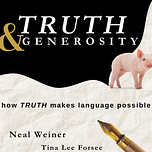One day a mysterious package arrives at my door.
It’s a book, The Gutenberg Elegies.
Did I order this? No, it must have come from Ptolemy. (He’s the kind of guy who sends friends books. And yeah, you should be jealous!)
I just assume he liked this book and wanted to share it with me. But then, much later, I come across this passage:
“In writing we grope toward what we think of as the inevitable wording, as though the prose were already finished in an inner place we can just barely reach…
The core question is: What do we do with words when we read? I would argue that we make another person’s words our own not simply by looking at them but by apprehending, inhabiting, and reinscribing them. “The dock was old and ramshackle. The peeling boards were springy underfoot.” We can only take possession of the words by filling them out with our own recollected experience…
…when we read we bring the life—ultimately our life—to the words.
This is one of the great incentives and surprises of reading: that we are at all times so close to the subthreshold energies of the self. “The peeling boards were springy underfoot” means nothing much until we have produced the sensations in ourselves—created them. To do so we have had to brush against the original traces, whatever it is we carry inside that holds our knowledge of springy boards…
Every true reader, then, is a writer and every true writer is a reader, and every person engaged in the project of self-awareness is the reader and writer of himself. Writer and reader: They are the recto and verso of language, which is itself the medium of our deeper awareness.”
—Sven Birkerts, The Gutenberg Elegies: The Fate of Reading in an Electronic Age. First written in 1994. [My emphases].
This echoes our message in Truth & Generosity.
As a writer, discovering the ‘inevitable wording’ is my holy grail. Cliche? Yeah, sure. But as a reader, I know what it’s like to experience such moments.
Sometimes a writer brings forth the most vivid recollections of what is vague, almost forgotten, inside me—not with ‘beautiful’ words, but with startling precision. The experience being described doesn’t have to be all that exciting; for me the most thrilling passages tend to be of mundane experiences, since what is taken for granted is often the hardest to articulate.
Let me give you an example. I chose this passage not merely to promote a friend—shout out to
, BUY HIS BOOK!—but because it’s exactly the kind of thing I have in mind.What is it like to eat a cherry?
A glass of port wine with this man at the Ulva boathouse, a wedge of cheddar shared between us, a few slices of warm bread, and these splendid cherries taken into the mouth one by one—the unyielding fruit tasteless before the crack of the flesh and the burst of juice.
—The opening pages of his novel, Mrs. M.
Unyielding and tasteless before the crack of the flesh…how delightfully true!
Of course, it’s just a cherry. So what?
And yet I find the description deeply satisfying. From it I learn the writer experiences cherries the same way I do. But there’s more to it than the pleasure that comes from recognizing a shared experience. Reading passages like this brings my awareness to a new height—my next cherry will still taste like a cherry, and yet it will be more vibrant than the ones that came before.
By reading, I hope to experience life more articulately.
—Tina
11
How We Recognize Language as Language
DAVIDSON ARGUES that we cannot recognize as language that which we cannot interpret. We can only recognize a language as such if it agrees with us about a great many things. Similarly, we cannot recognize as intelligent an alleged mind that does not for the most part agree with us. Thus it turns out to be empirically insignificant to imagine an intelligence in fundamental disagreement to us, or even to imagine a language in which such beliefs could be expressed. If there were beings who disagreed with us on a grand scale, the task of interpreting them would force us to translate their speech so as to make that fact invisible. And if we failed to translate their language, we would have to deny their intelligence. In other words, we would be forced to view their ‘language’ on a par with the gurgles of indigestion or the howling of the wind—not wind full of fury, for even that would have far too much significance.
Listen to this episode with a 7-day free trial
Subscribe to Philosophy and Fiction to listen to this post and get 7 days of free access to the full post archives.









